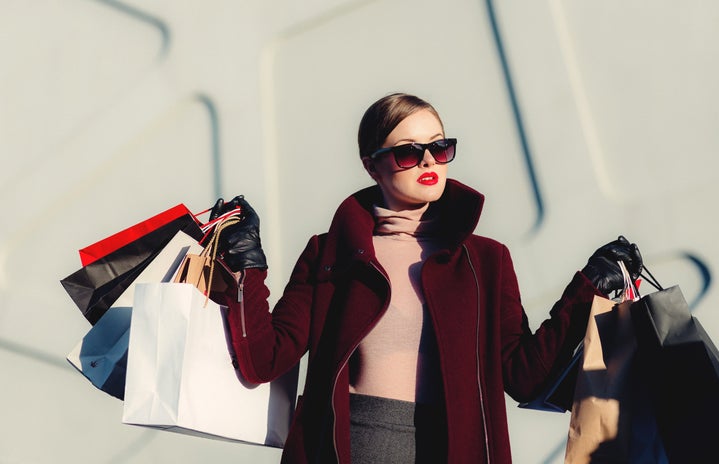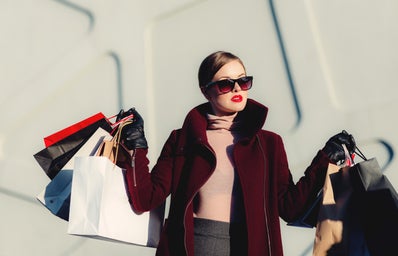As a Lebanese-American woman, avid shopper, and activist, I am always looking to make conscious purchases from Middle Eastern brands. Here are some companies I’ve found that empower women, support local economies, and aid refugees. If you like to both look good and feel good about where you spend your money, check out these five trendy sites!
- BabyFist
-
BabyFist demin was started by Yasmeen Mjalli in 2017, a Palestinian-American women’s rights activist, after she hand-painted the Arabic phrase “Not Your Habibti” on the back of her jean jacket. In English, this translates to “Not Your Baby,” a phrase used to empower women and challenge gender roles in American society. BabyFist similarly advocates for gender equity in Palestine, where “Arab identity is complex and inherently undefinable.” The company manufactures their products through both a family-run business in Ramallah and the textile industry in Gaza in order to help rebuild the local economy. Ten percent of BabyFist’s profits are donated to its 2019 Menstrual Education Campaign, through which the company educates young girls in the West Bank about menstruation, sexuality, and womanhood. Each jacket, t-shirt, hoodie, tote bag, dress, and sticker the company sells promotes social change; everything is also very affordable, with all prices under 60 dollars!
- Mochi
-
Mochi: The Art of Embroidery was established in 2013 by designer Ayah Tabari. Tabari was born in Palestine, but raised in Amman, Jordan, and Riyadh, Saudi Arabia; she studied in London and currently resides in Dubai. With her eclectic Middle Eastern background, Tabari aims to highlight a variety of cultures through fun, colorful, and intricate patterns in her collections. Mochi sells clothing, accessories, and shoes for various occasions, seasons, and ages. Every collection is based on a different community; to accurately represent the local people and traditions, the company travels to and immerses itself in each location. Mochi also empowers local women by providing jobs: “We aim to assist these communities by creating jobs and opportunities for work and growth among these women in hopes of contributing to their well-being, morale, standard of living and purchasing power.”
- Sarah’s Bag
-
My personal favorite! Sarah’s Bag is a Lebanese-based brand founded in 2000 by Beirut-born designer Sarah Beydoun. Each gorgeous bag sold is handmade by female prisoners, ex-prisoners, and underprivileged women in Lebanon. The company’s mission is to “empower both the women who make them and the women who wear them.” The team, consisting of over 200 trained workers, embroiders, sews, and beads these luxury bags that sell anywhere from 40 to 980 dollars. The company also provides economic opportunities to women, especially those most overlooked by society. Sarah’s Bag teaches prisoners skills that are useful upon release, and also allows them to make money for their families while they are incarcerated. As a result, Beydoun was recognized for her leadership in business and activism by the Oslo-based Business for Peace Foundation in 2016. Celebrities such as Beyoncé, Amal Clooney, and Queen Rania of Jordan have been spotted with a Sarah’s Bag.
- SEP Jordan
-
The Jerash camp in Jordan (also known as “Gaza camp”) houses around 50,000 Palestinian refugees – 520 of whom are employed by SEP Jordan. Founder Roberta Ventura, who lives in Geneva, Switzerland, established the brand in 2014 after spending time with the residents of Gaza camp. “SEP” stands for “Social Enterprise Project” as it hires refugee artisans to hand-embroider accessories such as shawls, bags, and keffiyeh (a traditional Palestinian scarf). Since many of these women fall below the poverty line, the company trains them at its SEP-Tamari Foundation Academy and pays them substantial weekly wages to earn a living and support their families. As explained on SEP Jordan’s website, “What makes us different is that we work with the camp residents as artists, rather than recipients of aid. We have the privileged opportunity to create sustainable paths to economic independence for hundreds of women and their families.” These beautiful textiles are a must-have!
- Vanina
-
Longtime friends Tatiana Fayad and Joanne Hayek founded this Beirut brand in 2007 with a love for jewelry and activism. When inflation struck the economy, these two women transformed the Lebanese pound into accessories. Thus, Vanina became known for “upcycling” old or trashed materials. The company promotes environmental and social awareness and has partnered with a variety of NGOs to raise money for refugee camps, minimize the spread of weapons, and empower women. The majority of their products are handmade with sustainable materials. Vanina’s handbags, jewelry, and apparel are all classy, sparkly, and feminine — the perfect addition to any wardrobe.


